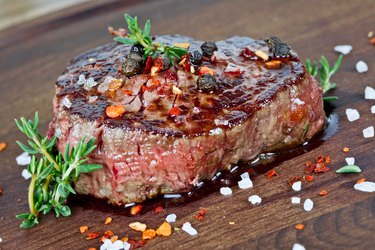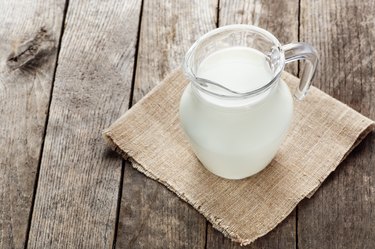
A well-rounded diet — especially one that promotes a healthy, lean physique — should pack plenty of protein. But not all protein is created equal. Proteins are made up of smaller building blocks called amino acids.
Some proteins have a more "complete" amino acid profile than others, making them more valuable for your diet. Complete means they have an optimal ratio of the 20 amino acids that exist in nature.
Video of the Day
Video of the Day
Both red meat and dairy contain all 20 amino acids necessary for the proper health of the human body and, as animal-derived proteins, are considered some the highest quality protein options you can choose. They share this distinction with other animal products such as eggs and poultry.
However, they differ in more subtle ways. Dairy appears to be slightly inferior to red meat in digestibility but superior in overall amino acid value.
Amino Acid Score
According to the Food and Agricultural Organization of the United Nations and the World Health Organization, the protein digestibility-corrected amino acid score, or PDCAAS, is the best method for evaluating protein quality based on the amino acid requirements of humans and the ability to digest protein. The PDCAAS is 121 for cow's milk but only 92 for beef, a common red meat.
However, some experts argue that protein beyond the threshold of 100 exceeds the typical amino acid requirements for humans. This means both are incredibly valuable when it comes to the ability of the human body to process the foods and access the amino acids.
Biological Value
Yet another measurement of protein quality is the biological value, which reflects the usability of the protein in a food. When you eat meat or dairy, just a portion of the amino acids are incorporated into your cells for muscle growth, repair and function.
Scientists can measure the biological value by calculating the ratio of nitrogen used for tissue formation divided by the nitrogen absorbed from food. Milk has a biological value of 91 versus only 80 in beef. This means that the protein consumed in milk is slightly superior in terms of your body's capacity to use it compared to that found in beef.
Read more: Non-dairy High-protein Foods

Dairy Proteins
Dairy protein is actually comprised of two proteins: casein and whey. Whey makes up about 20 percent of the milk and provides high levels of the essential and branched chain amino acids, making it excellent for athletic recovery.
You digest whey protein more quickly and your cells assimilate it faster than red meat protein. It also contains bioactive ingredients, such as antioxidants and immunoglobulins, that offer protective benefits for cardiovascular conditions, high blood pressure, diabetes, and cancer.
Casein releases amino acids into the blood stream more slowly than whey and red meat and has a high nutrient supply of calcium and phosphorous. You can purchase supplements of just casein or whey if you want to concentrate your intake of just one type of protein.
Read more: Does Milk Contain Protein?